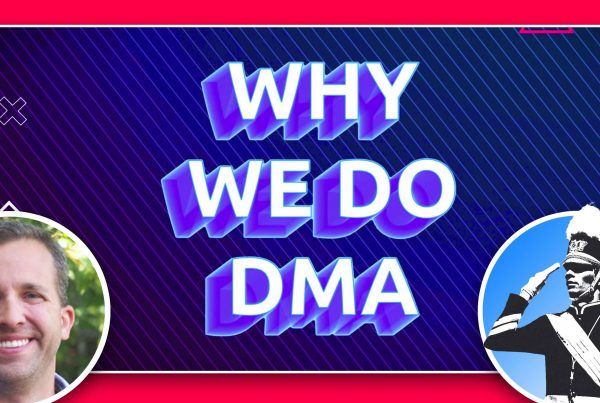Florida, Texas, Indiana… Anywhere you go, kids want to do well in band. The only variable in the equation is the teacher in front of them.
That’s our job. And that’s what DMA is for.
Justin McAdams is a DMA Lead Clinician. He’s a Band Director and Performing Arts Coordinator for the Phoenixville Area School District in Phoenixville, PA.
He’s been in the DMA family for 21 years: from student at West Chester to IMPACT member, staff member, and now Lead Clinician.
Justin proudly declares that DMA is a vital part of who he is.
Here’s how DMA helps Justin improve his teaching back at home—and how it can help you, too.
Here’s Justin’s story of how DMA helps him improve his teaching with his own band in southeastern Pennsylvania.
How DMA helps teachers.
It’s what I do on the podium. It’s what I do with my own band students.
It’s the things that I say. It’s the things that I teach. It’s the way that I teach.
They have all come out of the time in the experience that I have every summer working with some of the best students that are involved in band in the country.
As band directors, we get to the end of the school year and you know there’s a sense of fatigue.
We’ve got final exams, graduation, paperwork, cleaning up the band room… it can be really exhausting.
Then you have to factor in the emotional component.
You see your seniors graduating. Maybe they’re playing that that last time at graduation.
You see them walk across the stage. You give them a hug afterward. And that’s it—they’re gone.
And then you begin to wonder: what is going to come next? What’s gonna happen with your program in the upcoming year?
Every group has a different dynamic from year to year. When one graduates, the next comes in. But you never really get an idea of what it’s gonna be like until it starts.
All those emotional aspects at the end of the year can be exhausting. And there are times where I want some time off. I just need to decompress and relax.
But then I get on a plane.
I head to the first DMA workshop of the summer. And, very quickly, I find myself rejuvenated.
We could be sitting in a parking lot of some college campus, and we meet a brand new group of rising band upperclassmen.
Many have just been named drum major in their own programs, and they’ve gone through this process auditions and tryouts.
And now they have the title.
The excitement of getting that title is replaced with nervous energy. Oh my gosh, they think. I have to do this for real! What in the world am I going to do? I hope I don’t let anyone down.
By the end of DMA, I’m reminded of something about those kids. I’m reminded of something about my kids every year—
Kids are kids.
It doesn’t matter where you go. Pennsylvania, Maine, California, Colorado, Florida, Texas, Indiana… wherever.
Kids are going to be kids. They want to be good. They want to do well in band. And the only variable in the equation is the teacher standing in front of them.
It’s our job to empower them.
I’m fortunate that I get to be reminded of that fact each and every summer. It motivates me to keep striving to be the best teacher that I can.
DMA inspires the staff, too.
The summer is also a chance for all of us that work in DMA to reconnect. Many of us only get to see each other for 3 or 4 days out of the year— that’s only 1% of the year.
The best part of those few days is that we always get to pick up exactly where we left off the last summer.
Some of us have been together for a while others are at their workshop for the first time—it doesn’t matter.
There’s an instant connection and there’s an instant bond and that bond is there’s just something about DMA.
It’s a connection that exists with our own little world, but it also exists within the larger world of the marching arts.
Why we teach at DMA
Years ago, a friend and fellow teacher posed a question to me: Why we do what we do? Why keep doing this DMA thing? Why why be involved every summer?
Do we do this to get away from who we are? Or do we do this to become who we are?
After 21 years with DMA and 17 years of teaching in public schools, I can look back in my first couple of years and know that I’ve grown as an educator.
And a lot of that is as a result of DMA.
And I go back to that “become who we are” quote. For some reason, early in my career, I was doing my part of DMA to get away from who I was.
Who I was during DMA was not who I was in front of a band or classroom. I taught my band very differently than what I taught at DMA. To this day, I still don’t know why.
I know that I’ve evolved become a better teacher—I’ve still got a long way to go!—but I can tell you that the two personalities have truly merged.
What you see from a band rehearsal with me what you see when I’m working with students at DMA are one in the same.
Teaching and learning are all wrapped up in one. When you stop doing one of them, you might as well get out of out of the field entirely.
DMA creates an amazing experience every summer. And it empowers me to provide a better experience for my students in my own band.





